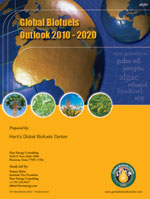 Despite the growing number of people who are calling for a global halt or scale back of biofuels development, global biofuel demand is still expected to grow. Biofuel use is projected to grow by 133 percent by 2020, primarily driven by government policies and renewable fuel mandates. However, despite the growing demand, the market is expected to be short by more than 8 billion gallons during this same time frame. This according to the newly released Hart report Global Biofuels Outlook, 2010-2020: Projecting Market Demand by Country, Region and Globally. The report looks at biofuel supply and demand in four key global regions and 35 countries.
Despite the growing number of people who are calling for a global halt or scale back of biofuels development, global biofuel demand is still expected to grow. Biofuel use is projected to grow by 133 percent by 2020, primarily driven by government policies and renewable fuel mandates. However, despite the growing demand, the market is expected to be short by more than 8 billion gallons during this same time frame. This according to the newly released Hart report Global Biofuels Outlook, 2010-2020: Projecting Market Demand by Country, Region and Globally. The report looks at biofuel supply and demand in four key global regions and 35 countries.
“Many countries are projected to find themselves with a supply deficit for ethanol and biodiesel by 2020,” said Tammy Klein, Assistant Vice President, Hart Energy Consulting, and global study leader. “This deficit is worse for ethanol than for biodiesel,” she said.
Hart projects that the global supply may be short 5 billion gallons for ethanol, and 3.4 billion gallons for biodiesel by 2020. Meantime, demand for biofuels is expected to grow through 2020 driven by public policies requiring biofuels blending. “We actually see the biofuels supply deficit begin to appear around the 2015 time frame,” said Klein.
It should come as no surprise that Brazil is leading the way for biofuel expansion and development followed by the U.S. Next in line is China, Japan, the UK, and Germany.
Frederick L. Potter, Executive Vice President, Hart Energy Publishing notes why Brazil has the lead. “With its favorable GHG profile, these countries will primarily look to Brazilian advanced sugarcane bio-ethanol for supply, especially given the global context of tightening GHG limits — and limited commercial volumes of cellulosic ethanol. Obligated parties in the U.S. will find themselves competing for these volumes as never before. We expect this to lead to continued price appreciation for sugarcane ethanol over the 2011- 2020 period.”
Klein noted that not only will Brazil retain its position as the world’s top exporter of ethanol through 2020 (Brazil is estimating that its ethanol production will double in the next 10 years) Brazil will be the leading country in position to consistently supply the global ethanol market. Maybe more disconcerting to the American ethanol industry, is that the report projec ts Thailand will run second behind Brazil with several Latin Amerian countries such as Columbia and Peru making significant contributions to the global market.
ts Thailand will run second behind Brazil with several Latin Amerian countries such as Columbia and Peru making significant contributions to the global market.
On the biodiesel front, Brazil, India, Spain, Argentina, Indonesia, Germany, and the United Kingdom will experience significant demand growth for biodiesel by 2020. “We do not expect new short-term capacity to be added to meet demand requirements since there is so much idle capacity in the world right now,” said Klein. “Rather, we expect utilization at existing facilities will increase over the 2011-2020 period, and for biodiesel blending limits to increase.”

